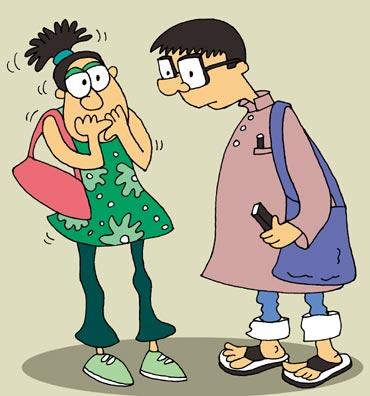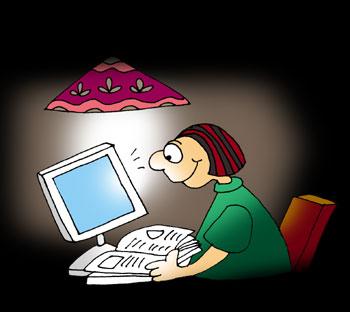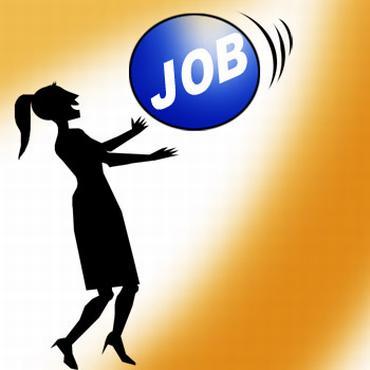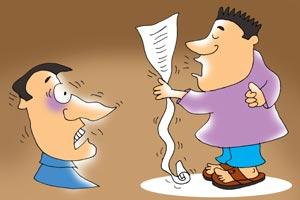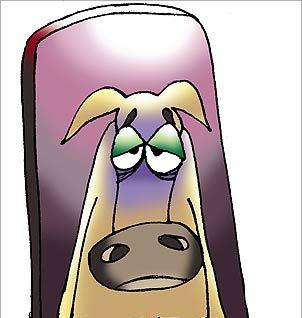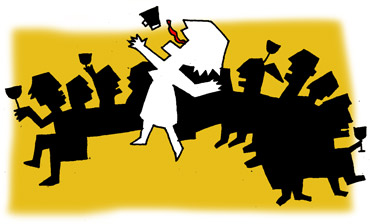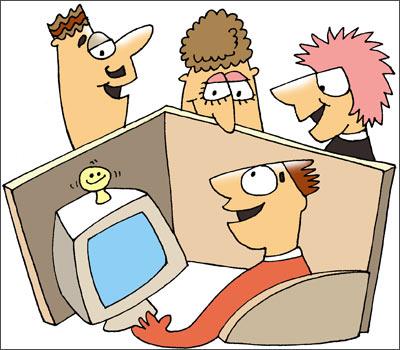 | « Back to article | Print this article |
11 blunders to avoid at job interviews
Vikas Shirodkar, Vice-president, Human Resource Development, General Motors, India spells out the blunders you must avoid during a job interview
A job interview is often exciting as well as frightening. It is very easy to slobber all over or make a mistake that might unwittingly close the doors of that company on you forever.
Vikas Shirodkar of General Motors tells us what these mistakes are and how you must work towards avoiding them at all costs.
Click Next to read on:
Wearing something inappropriate to the occasion
Whether we like it or not, the first impression we have of the candidate usually becomes critical in the recruitment decision. So it is crucial to pay attention to what you are planning to wear to the interview.
Sometimes people walk in wearing a pair of sports shoes or jeans.
This is certainly not business attire so it is a no-no. You must understand that a job interview is a professional commitment and you need to recognise the importance of neatness and grooming in such situations.
Wear a pair of proper leather shoes. You need not be in a tie and a jacket every time but pay attention to your clothes.
I remember interviewing a candidate who walked in wearing proper shirt and trousers but carried a jhola! This isn't acceptable formal attire for a corporate interview.
He could have gone for a plastic file or folder to carry the things he chose a jhola for. Or he could've kept it at the reception.
Not doing your home work
There are occasions when people walk into the room not knowing anything about the company.
This doesn't leave a good impression on your interviewer because it suggests the lack of effort and seriousness on your part to find out about the company.
Today there is no excuse to not have this information. Most companies have websites and information about the divisions, businesses, turnover etc is readily available.
Before you go for the interview, make sure you have sufficient information about the company.
Not knowing the job you are applying for
Reading the job description carefully is as crucial as the research you do on the company because if you've read it, you will be able to project yourself in the right way.
Let us for instance assume that the position you are applying for is that of a design engineer. You can tell the interviewer(s) why you are interested in design studies, which can further prompt a related question.
If you've read the job description it can also help you weed out the details about your career that are not relevant to the job and be able to focus on those that are.
A good interview is like telling a good story. You are presenting your case, your story, yourself and by doing your homework, it is possible to guide the interviewer to ask you the questions you want.
Going on an on about your family
Typically in most interviews, the first thing interviewers ask you is to tell them something about yourself.
The idea of this question is to help you settle down and give you a familiar and comfortable ground before you can move on to other questions.
When you are asked to speak about yourself you are expected to speak something about your upbringing and education but much more about your professional experience.
I have often seen people getting lost on this point. They will talk about the siblings and how one of them is married etc. That tends to put off interviewers.
You are the one who is being interviewed not your family. So stick to maybe a line or two about your family, perhaps a little more about your education and then quickly move on to your professional experience because that is what your interviewer is interested in.
Straying away from the point
This is related to the previous point. By meandering and not answering to the point you are wasting your interviewer's crucial time.
When you go ad infinitum about something, you are depriving the interviewer from asking the next question.
Give crisp and pointed answers. Learn where to stop.
Always remember that in an interview, the interviewer is the initiator.
You are supposed to respond. Put your point across; say firmly what you have to say and let the interviewer decide how much time s/he wants to spend on what areas and when s/he wants to move on.
Not watching out for non-verbal cues
You interviewer is also human and will give out non-verbal cues. Learn to pick them up.
Make eye contact. There are occasions when interviewees look away from the interviewer or look at their own shoes or take out a paper and look at that!
The idea of an interview is to engage the other person. Pick up on his/her body language and respond to them. If s/you notice that s/he is getting bored, stop. If you see him/her getting interested in what you are saying, say something more about it.
Some of us like to perceive a job interview as a war situation where you take a machine gun, fire away and walk out.
A job interview should be a conversation where the other person should get a chance to understand what you are talking about and the kind of person you are.
Taking up on the tea/coffee offer
Often an interviewer asks you for tea or a glass of water. My feeling is unless your throat is dry you shouldn't get into this at all.
As it is you are in a situation where you are nervous. So it is natural that your hand will shake when you're holding the teacup. What will make you even more uncomfortable is when you see that your interviewer is seeing your hand shaking.
So the ideal answer to this question is 'Thank you. I have just freshened up and would like to carry on with the interview. But you please carry on'. That way you don't make the interviewer feel guilty if about having his cuppa if he wants it!
Another reason why you shouldn't take up on the offer is that there is a chance that the cup of tea lasts longer than the interview.
There have been occasions when the interviewer is compelled to keep talking/asking simply because the interviewee hasn't finished his/her tea!
So you see why it is much better for an interviewee to stay away from the chai offer!
'I learnt it in my first year of college'
Candidates who have forgotten their basics often give us this response! And this is across the board -- right from freshers to senior executives.
The fact is that you are being hired for your knowledge in that area so if you are cornered you cannot brush off the question saying that you learnt it far too long ago to remember it.
Before you appear for any interview, brush up on your basics. And if you still find yourself without an answer it is much better to say that you don't remember it but are sure of where to look it up. It would also show that you are willing to go back to the basics if you must.
Not carrying a copy of the CV or reading it beforehand
Although usually interviewers have a copy of your CV it helps to carry a copy of it yourself.
It also helps if you read it on your way to the interview or earlier in the day so you are able to refresh on the points you have highlighted in it. This is often helpful if you have changed a few jobs and have spoken about your roles and responsibilities in each of them.
When you read your CV it helps you know what you should talk about and what you should avoid.
Besides reading the CV, also make it a point to read your job description on the day of the interview.
Another advantage of carrying a CV is that if the interviewer is unable to locate his/her copy, you can easily hand him/her yours! It makes you appear to be helpful and prepared.
Under any circumstances don't carry more than two copies of your CV.
Another thing that can be putting off is when you come across files with names like cv_version3.doc or cv_dec_2010.doc! It gives one the feeling that the only thing the candidate has been doing is updating his/her cv.
The ideal file name in such cases should be cv_ so the recruiter is able to access it easily on the computer drive and you don't reveal how often you have been updating your CV!
'I know so-and-so working in your company'
Never volunteer names and information on your own. For instance if you are asked what is your impression of this company, you can respond by saying that it is good because you happen to have a few friends here.
Leave it at that.
The natural response to this will be 'Who are these friends?' Reveal the names only then.
'No, I don't have any questions'
Most interviews end with the interviewer asking you if you have any questions.
Very often I have noticed that candidates simply say 'No!'
This is entirely avoidable because it doesn't necessarily sound very nice, sometimes even showing disinterest.
Ask the interviewer about the company's future plans or about how they are planning to expand. Make sure the question is relevant. For a change, after having to listen to candidates all this while, this will also give the interviewer an opportunity to speak!
Going back to an earlier point, asking questions at the end of the interview becomes easier if you have done your home work. You can always refer to something you've read on the company's website or a news clipping you've come across in your research. Questions you ask at the end are as crucial as the answers you give.

